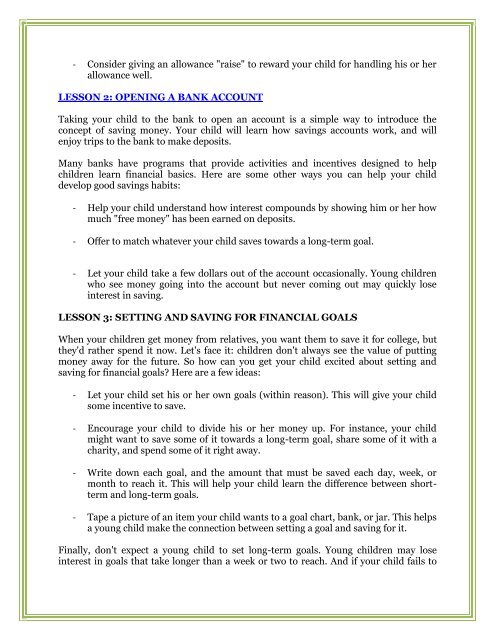Ameriprise Financial Abney Associates Team: Teaching your child about money
Ask you’re five-year old where money comes from, and the answer you'll probably get is "From a machine!" Even though children don't always understand where money really comes from, they realize at a young age that they can use it to buy the things they want. So as soon as your child becomes interested in money, start teaching him or her how to handle it wisely. The simple lessons you teach today will give your child a solid foundation for making a lifetime of financial decisions Abney Associates Team A financial advisory practice of Ameriprise Financial Services, Inc..
Ask you’re five-year old where money comes from, and the answer you'll probably get is "From a machine!" Even though children don't always understand where money really comes from, they realize at a young age that they can use it to buy the things they want. So as soon as your child becomes interested in money, start teaching him or her how to handle it wisely. The simple lessons you teach today will give your child a solid foundation for making a lifetime of financial decisions Abney Associates Team A financial advisory practice of Ameriprise Financial Services, Inc..
You also want an ePaper? Increase the reach of your titles
YUMPU automatically turns print PDFs into web optimized ePapers that Google loves.
- Consider giving an allowance "raise" to reward <strong>your</strong> <strong>child</strong> for handling his or her<br />
allowance well.<br />
LESSON 2: OPENING A BANK ACCOUNT<br />
Taking <strong>your</strong> <strong>child</strong> to the bank to open an account is a simple way to introduce the<br />
concept of saving <strong>money</strong>. Your <strong>child</strong> will learn how savings accounts work, and will<br />
enjoy trips to the bank to make deposits.<br />
Many banks have programs that provide activities and incentives designed to help<br />
<strong>child</strong>ren learn financial basics. Here are some other ways you can help <strong>your</strong> <strong>child</strong><br />
develop good savings habits:<br />
- Help <strong>your</strong> <strong>child</strong> understand how interest compounds by showing him or her how<br />
much "free <strong>money</strong>" has been earned on deposits.<br />
- Offer to match whatever <strong>your</strong> <strong>child</strong> saves towards a long-term goal.<br />
- Let <strong>your</strong> <strong>child</strong> take a few dollars out of the account occasionally. Young <strong>child</strong>ren<br />
who see <strong>money</strong> going into the account but never coming out may quickly lose<br />
interest in saving.<br />
LESSON 3: SETTING AND SAVING FOR FINANCIAL GOALS<br />
When <strong>your</strong> <strong>child</strong>ren get <strong>money</strong> from relatives, you want them to save it for college, but<br />
they'd rather spend it now. Let's face it: <strong>child</strong>ren don't always see the value of putting<br />
<strong>money</strong> away for the future. So how can you get <strong>your</strong> <strong>child</strong> excited <strong>about</strong> setting and<br />
saving for financial goals? Here are a few ideas:<br />
- Let <strong>your</strong> <strong>child</strong> set his or her own goals (within reason). This will give <strong>your</strong> <strong>child</strong><br />
some incentive to save.<br />
- Encourage <strong>your</strong> <strong>child</strong> to divide his or her <strong>money</strong> up. For instance, <strong>your</strong> <strong>child</strong><br />
might want to save some of it towards a long-term goal, share some of it with a<br />
charity, and spend some of it right away.<br />
- Write down each goal, and the amount that must be saved each day, week, or<br />
month to reach it. This will help <strong>your</strong> <strong>child</strong> learn the difference between shortterm<br />
and long-term goals.<br />
- Tape a picture of an item <strong>your</strong> <strong>child</strong> wants to a goal chart, bank, or jar. This helps<br />
a young <strong>child</strong> make the connection between setting a goal and saving for it.<br />
Finally, don't expect a young <strong>child</strong> to set long-term goals. Young <strong>child</strong>ren may lose<br />
interest in goals that take longer than a week or two to reach. And if <strong>your</strong> <strong>child</strong> fails to


